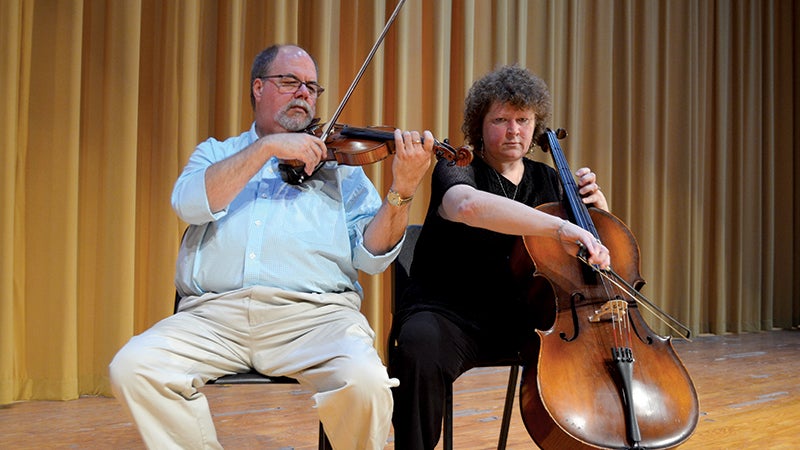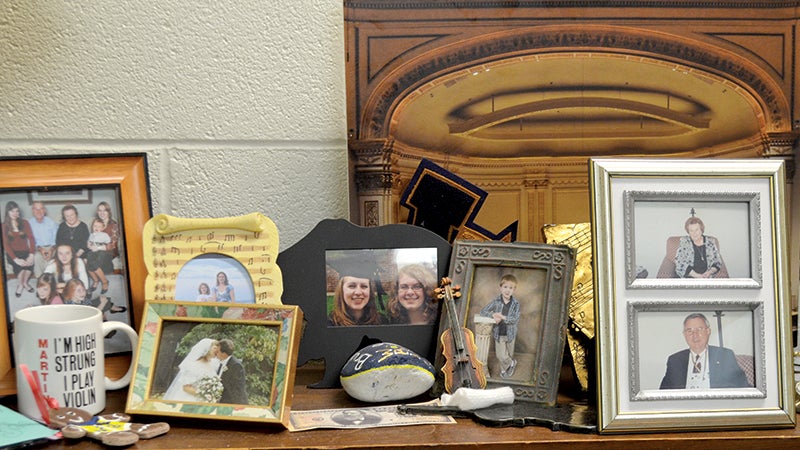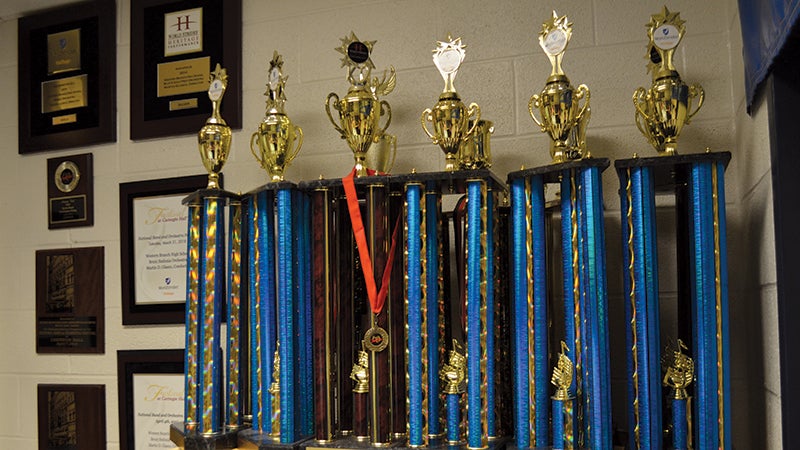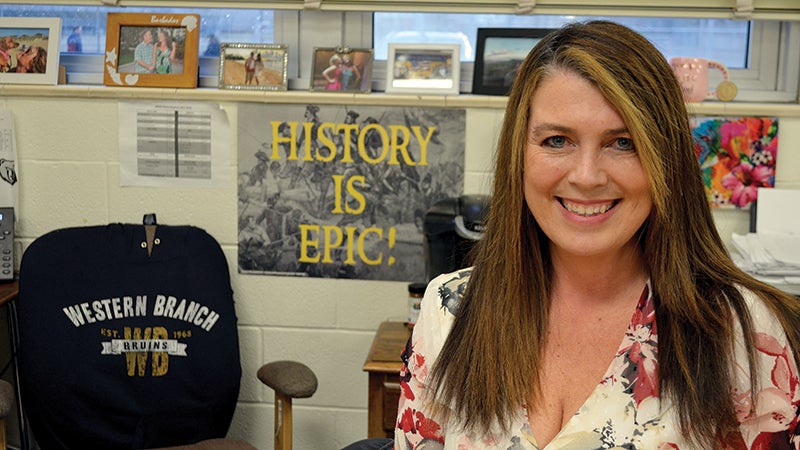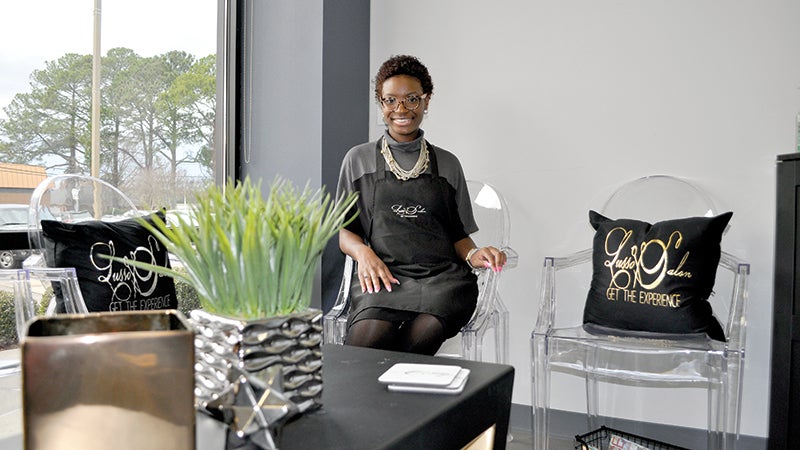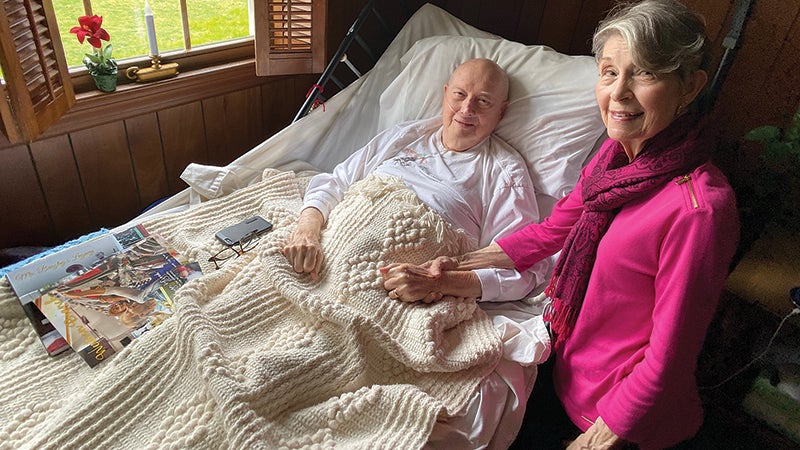‘Power couple’ shapes Western Branch orchestras
Published 3:47 pm Monday, October 22, 2018
The first time Martin and Alice Glasco met was at the Chesapeake Public Schools orientation for new teachers nearly 30 years ago. She was late and picked a chair right beside him. He already had notes sprawled out in front of him.
“She came in and asked, ‘what did they say, what did I miss, da da da,’” Martin recalled as he sat next to his wife in the Western Branch High School orchestra room. “She’s just talking, and we have no idea who the other is.”
They had graduated from rival high schools in Prince William County, Alice from Stonewall Jackson High School and Martin from Woodbridge High School. Their parents even found pictures of them playing in the same orchestras together back then, according to Alice.
Alice had just graduated from James Madison University when she applied for the same open position in Chesapeake’s burgeoning Orchestra Strings Program that Martin was after. Eventually, both of them were hired for this up-and-coming program. But the application process made things frosty between them in the beginning.
“She looked at my name and she said, ‘Oh, I’m the other string teacher that they hired.’ It was like instant static,” Martin chuckled.
“Instantly, he moved all his stuff over,” Alice said.
They were married less than a year after that first tense moment in the orientation. Martin said they just kept running into each other all of the time and bonded through music backgrounds built in the same Virginia locality, and both of them were caught in this strange new area for them in Chesapeake.
Quite literally, actually, since they both happened to move right next to each other in the same apartment complex.
“We came to find out that if you refer somebody to live there, you get a break on the rent, so every new music teacher was living at this apartment complex,” Martin said.
“Julie Knight, who’s the godmother of our kids and teaches at (Great Bridge Middle School), she’s the one that referred us. We made her pay indefinitely for getting that $200,” Alice said, laughing with her husband.
This dynamic duo oversees hundreds of orchestra students in the Western Branch community. Martin is the director of orchestras and chairperson of the Fine Arts Department at Western Branch High School, while Alice is orchestra director at Western Branch Middle School.
They came into this community’s program when it was just a few years into existence with a handful of teachers.
“We got in at the ground level, basically,” Alice said.
An estimated 400 students are under both of their wings, with roughly 180 taught by Alice and the older students by Martin. That includes their own three children over the years.
Their youngest, Carter Glasco, 11, is a rising seventh-grader at Western Branch Middle and their oldest, Morgan, 26, practiced the cello.
Daughter Meredith, 18, is expecting to play in the philharmonic orchestra at Mary Washington University when she starts her freshman classes there this fall. Of the three in the next generation of Glasco musicians, Meredith was the quickest to point out her parents’ mistakes in the classroom.
“I had to be extremely accurate when Meredith was in class,” Martin said.
“She was always the kid that would hold you to it,” Alice agreed. “If you said, ‘OK, we’re going to start a new song on Tuesday,’ then you better have that song ready to go on Tuesday.”
Martin smiled and said, “She gets that from her mother.”
Like Meredith, Alice was quick to correct him. “No, it’s from her father. It’s from your side,” she laughed.
They may disagree on Meredith’s influence, but they’re absolutely in sync on their vision for these young Western Branch violinists, violists, cellists and bassists. Alice teaches her students the basics and positive habits they need before they move on to Martin’s extensive rehearsals and preparations for major venues.
That’s the advantage of the middle school feeding directly into the high school, as opposed to one middle school sending students to potentially different high schools, according to Martin.
“Part of the beauty of Western Branch is that we just feed Western Branch,” he said.
It also helps that the two of them live right next to their schools, right in the neighborhood and less than a mile away.
“There are so many late-night commitments and things you have to go back for that it makes it a whole lot easier to live here,” Alice said.
“They always say teachers shouldn’t live in the community they teach, but our life really is this community,” Martin added. “Whenever you hire a band, chorus or orchestra director, you’re hiring a community sponsor. Someone who really does involve themselves in a much deeper aspect.”
Their strategy has paid off. Alice was named the Western Branch Middle School Teacher of the Year in 2000, and Martin followed suit at the high school in 2002. The high school performers have consistently place first and earned winning scores in competitions for years, Martin said.
His students have performed at Carnegie Hall in New York City four times since 2008. They were last at the world-class Manhattan venue in March, playing the works of classic composer Gustav Holst and Brian Balmages, who Alice quickly pointed out is a fellow James Madison alum.
This annual WorldStrides OnStage festival has an extensive auditioning process with hefty expenses for travel and tickets. But the Glascos emphasized how important it is for young musicians.
“It’s one of the few places you play that’s designed for you,” Martin said, as opposed to playing in a theater or other multi-purpose venue. “There’s a magic (to it). That stage is acoustically perfect. You can stand on the back wall, whisper and the fourth tier can hear you speak.”
Alice helps coordinate the chaos of maneuvering so many students and instruments into the Big Apple alongside her husband.
“We do everything together, she said. “Imagine getting three buses through New York City, full of instruments.”
They explained how grateful they are for the immense support of parents and outstanding work by students during their tenure. One of the most important lessons they’ve learned is not to judge a student’s potential and just focus on giving them opportunities to shine.
“You don’t know when they’re going to wake up or when they’re going to be inspired,” Martin said. This applies to shy, struggling students who may seem docile but are burning internally to do the work and overcome. “The thing that we’ve learned is to stay back, hold back and don’t judge.”
But at Carnegie Hall in 2015, their patience was wearing thin. They had 135 students scheduled to perform, and they struggled to get their sound right in backstage warmups. Alice had left the room in frustration, leaving Martin with a crucial coaching call.
“I remember thinking, I got two plays on this. I can either let them have it both barrels, or be positive and spin it. So, I went with the positive spin,” according to Martin.
When they finally got on stage and began to play, everything clicked for them. Everything they had been practicing for numerous hours each and every day was resoundingly left on the stage. The applause at the end of the night must have felt like the ultimate seal of approval.
“We had children in tears when they came off the stage,” Martin said. “We had students that honestly, (finally) understood why they’ve been playing this instrument as long as they have and what they’ve been doing. There’s something about it that connects you to the whole global musical thing.
“It’s nothing that I can do in a classroom. That’s why that opportunity is so big.”
That sense of accomplishment is what Alice is most proud of in her time in Western Branch with her husband.
“My goal isn’t to have the next best violinist,” she said. “It isn’t to send 20 kids off to become violinists. I think it’s just (to give them) a love of music, and an understanding and appreciation of music. There’s so much that music teaches you about working together, about dealing with people you don’t want to deal with when you’re stuck sitting next to them in class.
“They can learn something early on and by the time they finish, they’ll see what they’ve accomplished.”


